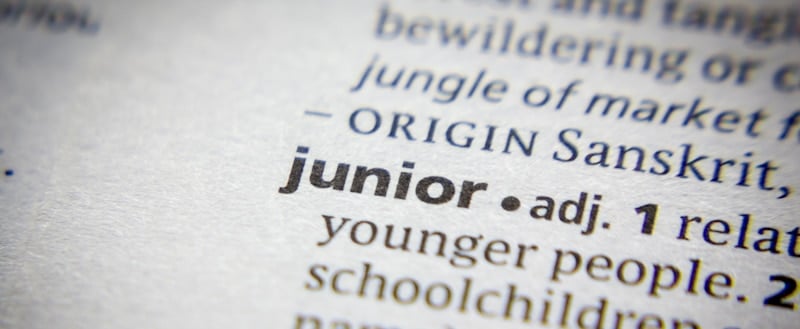When Junior is abbreviated, it becomes Jr. Therefore, before any further discussion, the two words mean and are the same. Junior can be used to denote youngest, low ranks or status, or even young years. On the other hand, Jr. is applied to distinguish the son from the father, and both the son and the father have the first name.
It should be noted that “Junior” can only be capitalized when it is used as a proper noun while “Jr.” is always capitalized since it’s an individual name. From a grammatical perspective, names are nouns; hence, they have to be capitalized.
Example:
- Martin Luther King, Jr.
The above sentence means that both the father and son have the same names, and the one referred to or mentioned above is the son. In other words, there’s Martin Luther King’s senior.

When it comes to capitalizing on the “Jr.” and “Junior,” some challenges may arise. This is because some users tend to get confused with the two when it comes to the application point of view.
Rules of Capitalizing “Jr.” and “Junior.”
To start with, capitalizing “Junior” should begin with grade levels. Getting acquainted with capitalization rules, especially the grade levels, can be confusing because many people think that grade levels are proper nouns. However, this is not the case; actually, it’s a grammatical error.
- My son will join a Junior school next year-(Incorrect sentence since junior is capitalized)
- My daughter’s Junior school buddies are very annoying; they call her in the middle of the night- (grammatically incorrect, Junior should not be capitalized)
- Even though I am trained, I don’t know the dynamics of coming up with a Junior school syllabus- (The wrong sentence, Junior should not be capitalized)
The term “junior” should be in lowercase in the sentence since it’s applied as a general noun. This should be the case with other high school levels, such as sophomore and freshman. The word can only be capitalized if it’s used as a proper noun and when referring to a specific entity or group.
- The junior school students should be taught about self-respect- (Correct sentence, junior applied as a general noun)
- The girl’s junior school grades were so impressive; hope she keeps on with the trend- (correct sentence, the junior is a general noun)
- My son joined St. Thomas Junior School, he is so happy-(Correct sentence, junior occupies the proper noun space)
- My daughter wants to join Aquinas Junior School, any help- (Correct sentence, Junior refers to a specific institution)
What If Someone Uses “Junior” As A Name Or Nickname?
You must have across these people who are either called “Junior,” or their nickname is “Junior.” How do you deal with such situations? First, in such incidents, it should be noted that “junior” plays the role of one’s name, and names are nouns; hence they have to be capitalized.
Example:
- The book belongs to Junior’s mother- (Correct sentence since junior is someone’s name)
- Junior came home very drunk- (grammatically correct)
- Evans and Junior enjoyed the moments- (grammatically Correct sentence)
“Junior” Starting The Sentence.
“Junior” can be used at the start of the sentence; in this case, the word can be either a proper noun or a real noun. And with the set rules, the story that starts a sentence should be capitalized.
Example:
- Junior is a conqueror; he beat colon cancer, he is cancer-free
- Junior schools have become a business; everything about them is so overpriced.
- Junior grades are not that important; what’s important is what you have acquired after studying.
- Junior’s mother gave birth to twins.
Can “Junior” Be Capitalized If Used At The End Of A Sentence?
There are various types of sentences. Some can use “Junior” at the start of the sentence, while others can apply it within the sentence, while others will apply it at the end of the sentence. At the beginning of the sentence, as mentioned above, the word will be capitalized; when the term is used within the ruling, the rules state that it can only be capitalized if the word is a proper noun, someone’s name, or nickname, or refers to a specific institution. What happens if the term is used at the end of the sentence?
The rules remain similar to those of the start sentence. Meaning, if the word is a proper noun or an individual’s name or nickname or refers to a particular institution, it should be capitalized.
Example:
- The world does not start and end with Junior. – (Correct sentence since junior refers to an individual’s name)
- The deal was almost done, and the group reached their goal, thanks to Junior. – (Junior is one’s name and should be capitalized; therefore, the sentence is grammatically correct)
Capitalizing “Jr.”
As mentioned above, “Jr.” is the abbreviation of junior. But the “Jr.” plays the role of one’s name explicitly. You may have heard of family members who have the same names. For one to be distinguished from the other, the “Jr.” factor is introduced. But many people commit some grammatical errors in the application of “Jr.” in a sentence.
Examples
- Have you ever heard of one Martin Luther King Jr? – (wrong sentence, Jr. should be capitalized)
- Have you ever heard speeches of one Martin Luther King Jr? – (correct sentence, Jr. is capitalized)
Some even commit mistakes by putting a comma before “Jr.” For example:
- Since he is the son of Bobby Charlton, Jr., He brags a lot. – (the wrong sentence; a comma should not be placed before JR)
- Like father like son, Fidel Castro, Jr is so combative like his father- (The sentence is wrong since it puts a comma in front of Jr)
Can “Jr” Be Used At the Start Of A Sentence?
The answer is straightforward, big no. This is because “Jr” is an abbreviation, and from every language grounds, abbreviations cannot start a sentence. But some people tend to make this big grammatical blunder, and thinking that they are right, they capitalize “Jr,” making the whole sentence grammatically incorrect.
Example:
- Jr’s son came to our place- (the sentence is purely incorrect; the name of senior is not mentioned, making the sentence redundant)
- Jr. will ride the horse down today- (the sentence is also incorrect because the specific name is not mentioned and abbreviations do not start sentences)
Can “Jr” Be Used In Question Mark Sentence?
“Jr” can be used in a question mark sentence if the sentences are well incorporated with the subject and verb. Besides, the question should be either a dependent or independent clause.
Example:
- Was Martin Luther King Jr shot in the head or chest?
- Was Bob Charlton Jr the best striker in the premier league history?
- Still waiting for Victor Manhandle Jr arguments?
Other Examples Of “Junior” And “Jr.”
- Since my son joined Nickbella Junior School, he has vastly improved in mathematics and English.
- She was promoted to senior manager after serving as a junior staff member for three years.
- The junior varsity basketball team had a tough loss in their game yesterday.
- Honestly, do you see any of his father’s features in him? Nicknon Mcathy Jr is the best definition of laziness.
- My little brother is a junior in high school this year and is already looking at colleges.
- As a junior accountant, he was responsible for handling small accounts and bookkeeping tasks.
- The junior members of the club had to wait until the seniors finished their meeting before they could start theirs.
- I’m proud to be a junior member of the volunteer organization, even though I haven’t been there long.
- Jr. had been calling for days but getting the phone after everything that had happened was impossible.
- She always said when she had a child if it was born a boy he would be called Jr. after her husband.
Final Thoughts
“Junior” or “Jr” are not tricky words to use. One should know that they are the same words, but they are different when applying. Hence, their capitalization is also different. “Junior” can be only a noun or proper noun under certain conditions, while “Jr” is a noun no matter the case.
Shawn Manaher is the founder and CEO of The Content Authority. He’s one part content manager, one part writing ninja organizer, and two parts leader of top content creators. You don’t even want to know what he calls pancakes.



